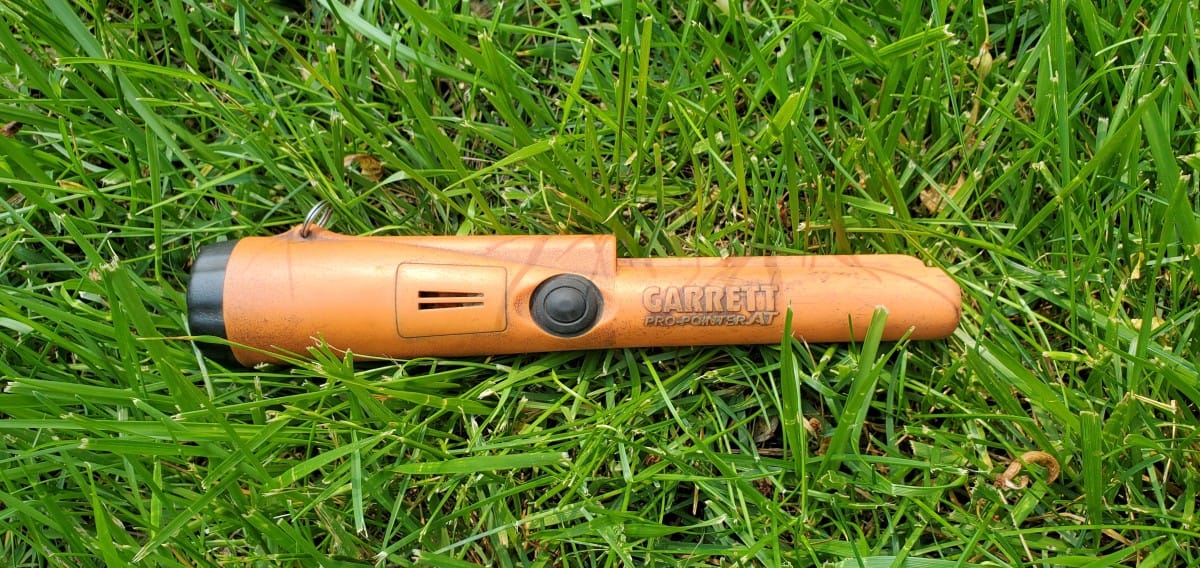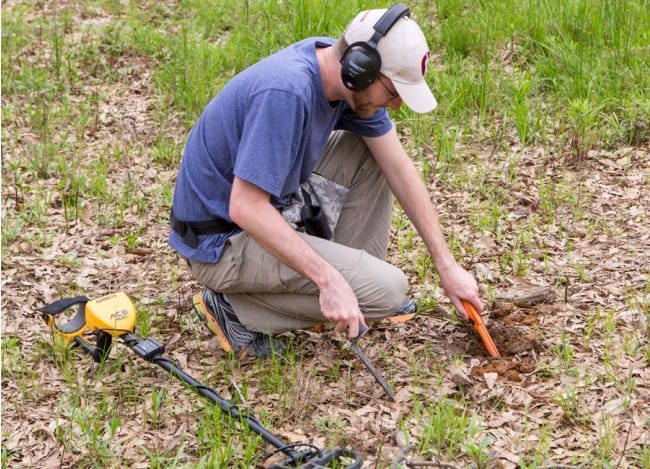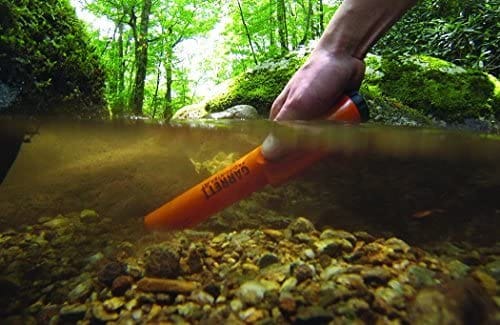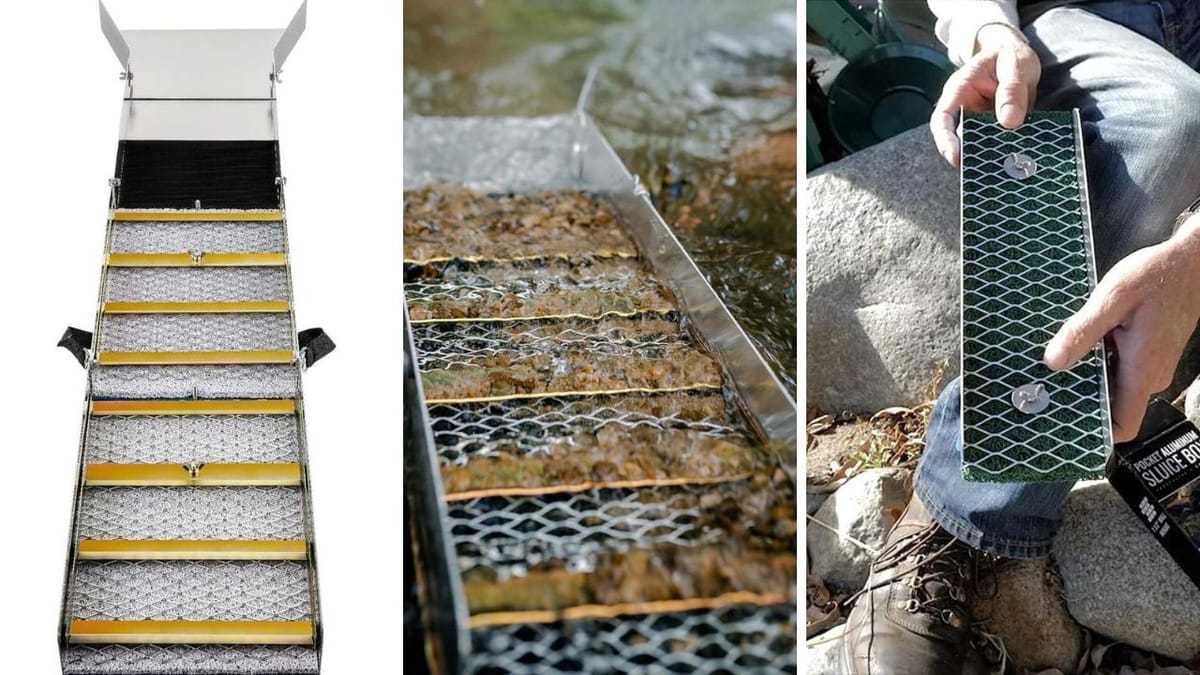Metal detecting is a hobby that combines the thrill of discovery with the great outdoors. Whether you're searching for lost treasures or simply enjoying the hunt, a metal pinpointer is an indispensable tool for any enthusiast.
In this comprehensive guide, we'll explore what a metal pinpointer is, how it works, and why it's a valuable addition to your metal detecting gear.
Key Takeaways:
- Understand the function and benefits of a metal pinpointer in the metal detecting hobby.
- Learn about the features and technology that make pinpointers precise and user-friendly.
- Discover practical tips on how to use a pinpointer effectively to locate targets with greater accuracy.
The Basics of Metal Pinpointers
A metal pinpointer, often referred to as a mini metal detector, is a handheld device designed to precisely locate metal objects in the ground, dirt, or soil.
Unlike traditional metal detectors with larger search coils, pinpointers are used to zero in on the exact location of an object after a larger detector has signaled a find. This specificity saves time and makes the retrieval process much more efficient.
Pinpointer metal detectors are valuable tools for any metal detecting enthusiast. They are small, portable, and can be easily carried in a belt holster or pocket.
Most models are equipped with adjustable sensitivity to help locate targets of various sizes and compositions, from gold to relics, in a precise area.
Modern Metal Detectors vs. Pinpointers
Modern metal detectors are equipped with technology that allows them to cover a larger detection field, making them ideal for initially detecting metal objects.
However, once a signal is found, pinpointers take over to provide precise pinpointing. This is especially useful in noisy environments or when searching holes where larger targets may have been missed by the larger search coil.
Pinpointers operate on the principle of proximity. The closer the pinpointer's tip is to the metal object, the stronger the signal.
This allows for a more accurate and efficient recovery of the item, reducing the amount of unnecessary digging and disturbance to the ground.
Features of a High-Quality Pinpointer
When considering a new unit, look for a metal detector pinpointer with a waterproof rating. This feature is crucial if you plan to search rivers or in salt water.
A waterproof pinpointer, sometimes known as a scuba detector, can be submerged and used in various environments without damage.
Additional features to consider include a long battery life, a robust power source, and a durable design. An LED light can be a significant advantage in low-light conditions, and a vibration mode can help in detecting in noisy environments. T
he best pinpointer will offer a combination of these features at the best price.

The Garrett Pro Pointer: A Case Study
The Garrett Pro Pointer is a popular choice among metal detecting hobbyists. It's known for its fast retune technology, which allows users to narrow the detection field for precise location of small targets. The Garrett Pro Pointer also boasts a waterproof rating, making it suitable for use in various terrains, including wet conditions.
This handheld device is a prime example of a pinpointer that combines functionality with user-friendly design. Its sensitivity levels can be adjusted to cater to different types of soil and mineralization, ensuring that you can locate targets efficiently regardless of the ground conditions.
How to Use a Pinpointer Effectively
To use a pinpointer, start by using your traditional metal detector to find a general area where metal might be located.
Once you've identified a potential spot, take out your pinpointer and begin to narrow down the precise location. The pinpointer will emit a series of beeps or vibrations that increase in intensity as you get closer to the target.
It's important to move the pinpointer slowly and methodically over the area. This will help you to avoid missing any valuable items and ensure that you're not digging more than necessary. Once the pinpointer indicates the exact spot, you can start digging for your next treasure.
Pinpointers in Different Environments
Metal detecting pinpointers are versatile and can be used in a variety of environments. For those who enjoy beachcombing, a waterproof pinpointer is essential.
It allows you to search in the wet sand and even underwater, expanding your search area. In contrast, if you're searching in parks or historical sites, a pinpointer with adjustable sensitivity will help you to locate targets without damaging the precious ground.
For urban treasure hunters, pinpointers can help to sift through trash and other metal debris to find lost treasures that are hidden among the refuse.
The precise pinpointing capabilities of these devices mean that you can recover items from the most cluttered environments.

The Importance of Adjustable Sensitivity
Adjustable sensitivity is one of the most crucial features of a pinpointer. It allows the user to fine-tune the device's responsiveness to different sizes and types of metal.
For instance, if you're searching for very small targets like gold nuggets, you'll want to increase the sensitivity to detect the subtle signals they emit.
Conversely, in areas with high mineralization or lots of metallic trash, reducing the sensitivity can help to avoid constant false signals.
This feature ensures that your metal detecting experience is both productive and enjoyable, regardless of the search conditions.
The Role of Vibration and Audio Signals
Vibration and audio signals are key components of a pinpointer's alert system. In noisy environments where audio cues might be missed, vibration alerts can be a game-changer. They provide a tactile response that indicates the presence of metal without relying on sound.
Some metal detecting pinpointers offer the option to use audio, vibration, or a combination of both. This flexibility ensures that the device can be tailored to the user's preferences and the specific conditions of the search area.
Pinpointer Metal Detector Techniques
Have you ever wondered how the pros make pinpointer metal detector work seem like a walk in the park? It's all about technique. When you're out in the field, the way you handle your pin pointers can make a significant difference in your treasure hunting success.
For starters, sweeping your pinpointer in a small, tight pattern close to the ground can help you zero in on items that your larger detector may have signaled. This method ensures that you're covering the ground thoroughly and not missing any hidden gems.
Moreover, when you've got a signal and you start to dig, your pinpointer becomes your best friend. It's crucial to insert the pinpointer into the side of your hole, rather than straight down.
This approach helps you avoid potentially scratching your find. Remember, the goal is to recover treasures intact, and the right pinpointer technique can help you do just that.
So next time you're out detecting, pay attention to your movements and refine your approach for better results.

The Evolution of Pinpointer Technology
Have you ever wondered how pinpointer work has evolved over the years? It's a fascinating journey that mirrors the advancements in electronics and material science.
Initially, pinpointers were simple, static tools that offered minimal assistance beyond basic metal detection. However, modern devices now boast an array of sophisticated features such as improved sensitivity, discrimination capabilities, and even GPS functionality.
These advancements have not only made treasure hunting more efficient but also more enjoyable for enthusiasts.
The latest pinpointer models incorporate cutting-edge technology that allows for seamless integration with other metal detecting equipment. For instance, some pinpointers can communicate wirelessly with metal detectors, providing a harmonious detecting experience.
This synergy ensures that you spend less time digging aimlessly and more time uncovering the treasures that lie beneath.
As pinpointer work becomes more advanced, the precision and ease of locating small targets have significantly improved, making these tools indispensable for any serious treasure hunter.
Pinpointer Maintenance and Care
Maintaining your pin pointer is crucial for ensuring its longevity and reliability during your treasure hunting adventures. Regular care involves cleaning the device after each use, especially if it's been used in muddy or sandy environments.
Dirt and debris can clog the sensitive areas of the pinpointer, leading to decreased performance or even damage. It's also important to check for any signs of wear and tear, such as cracks or loose components, which could affect its functionality.
Moreover, proper storage of your pinpointer is just as important as its cleaning. Always store the device in a cool, dry place away from direct sunlight and extreme temperatures, which can degrade its electronic components over time.
By taking these simple steps to care for your pinpointer, you'll ensure that it continues to work effectively on your treasure hunting expeditions, helping you to pinpoint with precision and confidence.
Remember, a well-maintained pinpointer is a reliable partner in your quest for hidden treasures.

The Synergy Between Pinpointers and Digging Tools
When it comes to metal detecting, the relationship between your pinpointer and your digging tools is symbiotic.
Think of them as the dynamic duo of treasure hunting. A pinpointer metal detector is designed to guide you to the exact location of your find, but without a proper digging tool, you might as well be searching with your hands tied.
The key is to use a digging tool that complements your pinpointer. For instance, a hand trowel or a digging knife with a serrated edge can be incredibly effective when used alongside your pinpointer.
Imagine you're out in the field, and your metal detecting pinpointer alerts you to something beneath the surface. You'll want to dig a plug—a horseshoe-shaped cut in the soil—so you can flip it open and run your pinpointer over the exposed dirt.
This technique minimizes damage to the ground and makes it easier to replace the soil after retrieving your find.
By mastering the use of both your pinpointer and digging tools, you'll not only increase your efficiency but also practice responsible metal detecting that respects the environment.
Pinpointers and Gold Prospecting
Gold prospecting is an area where pinpointers can be particularly useful. Gold is often found in small flakes or nuggets, which can be challenging to locate with a traditional metal detector alone.
A pinpointer with high sensitivity levels can help to identify these tiny pieces amidst the soil or gravel.
When searching for gold, it's also beneficial to have a pinpointer that is water resistant or waterproof. This allows prospectors to search in streams or rivers where gold is commonly found without worrying about damaging their equipment.
The Convenience of a Belt Holster
A belt holster is a simple yet essential accessory for any pinpointer. It provides easy access to the device while keeping your hands free for digging or operating a larger metal detector.
Most models come with a holster included, but if not, it's a wise investment to purchase one separately.
The holster not only adds convenience but also protects the pinpointer from the elements and potential impacts. This can extend the life of the device and ensure that it's always ready when you need it.

Battery Life and Power Considerations
Battery life is a critical factor to consider when choosing a pinpointer. A device with a long battery life will allow you to search for extended periods without the need for frequent replacements or recharging.
Some models offer rechargeable batteries, which can be more cost-effective and environmentally friendly in the long run.
It's also important to consider the type of power source used. Some pinpointers use standard AA or AAA batteries, while others may require specialized batteries.
Ensure that replacements are readily available and consider carrying spares during long detecting sessions.
Searching Holes and Tight Spaces
One of the primary uses of a pinpointer is searching holes and tight spaces where a larger metal detector's coil cannot reach. After digging up a plug of soil, a pinpointer can be inserted into the hole to locate the exact position of the metal object. This minimizes the need for excessive digging and preserves the condition of the search area.
In tight spaces, such as between rocks or within crevices, a pinpointer's small size and precise detection capabilities make it the ideal tool for recovering hidden items that might otherwise be overlooked.
Waterproof Pinpointers for Underwater Searches
Waterproof pinpointers are a must-have for anyone interested in underwater metal detecting. Whether you're searching in freshwater lakes or the ocean, a waterproof rating ensures that your pinpointer can withstand the conditions.
Some pinpointers are rated for depths of up to 10 feet or more, making them suitable for scuba detecting and snorkeling searches.
When choosing a waterproof pinpointer, consider the depth rating and ensure it matches the type of water searches you plan to conduct. Also, look for models with a bright color or built-in LED light to improve visibility underwater.
The Impact of Ground Conditions
Ground conditions can significantly affect the performance of a pinpointer. Highly mineralized soil, for example, can cause false signals or reduce the detection range.
A pinpointer with a fast retune feature can help to adjust quickly to varying ground conditions, maintaining its accuracy and reliability.
In areas with heavy trash or metal debris, a pinpointer with adjustable sensitivity levels can help to discriminate between valuable targets and junk. This saves time and effort by allowing you to focus on the items that are truly worth recovering.
Additional Features to Look For
When shopping for the best pinpointer, consider additional features that can enhance your metal detecting experience. Some models offer interchangeable tips for different types of terrain, while others have built-in rulers to measure the depth of your finds.
Other models may include features like an auto-off function to conserve battery life or a lost pinpointer alarm to help locate the device if it's misplaced. These additional features can make a significant difference in the convenience and functionality of the pinpointer.
Choosing the Right Pinpointer for You
Selecting the best pinpointer for your needs involves considering several factors, including the types of environments you'll be searching in, the targets you're after, and your budget.
Compare different models and read reviews from other metal detecting enthusiasts to find a unit that offers the best combination of features, performance, and price.
Remember to also consider the manufacturer's reputation and the warranty offered. A reliable pinpointer from a reputable brand can provide peace of mind and ensure that you have support in case of any issues.
What is a Metal Pinpointer
Some Final Thoughts
A metal pinpointer is an essential tool for any metal detecting hobbyist. It's a handheld device that helps to precisely locate metal objects after they've been initially detected by a larger metal detector.
Pinpointers save time and effort by providing exact location information, allowing for more efficient recovery of targets. With features like adjustable sensitivity, waterproof ratings, and various alert systems, pinpointers are versatile and can be used in a wide range of environments.
When choosing a pinpointer, consider the specific features that will best suit your metal detecting activities and ensure that you select a reliable and user-friendly model.
FAQ's
Can a metal detector pinpointer detect all types of metal?
Yes, most metal pinpointers are capable of detecting a variety of metals, including gold, silver, copper, and iron. The sensitivity levels can be adjusted to better detect specific types of metal.
How deep can a metal pinpointer detect objects?
The depth at which a pinpointer can detect objects varies by model and the size of the target. Generally, pinpointers can detect small items up to several inches deep, while larger objects may be detected deeper.
While metal detecting, is it necessary to have a metal detector if I have a pinpointer?
While a pinpointer is a valuable tool for locating the precise position of metal objects, it is not a replacement for a traditional metal detector. Pinpointers are used in conjunction with metal detectors to refine the search area and recover targets more efficiently.













Member discussion